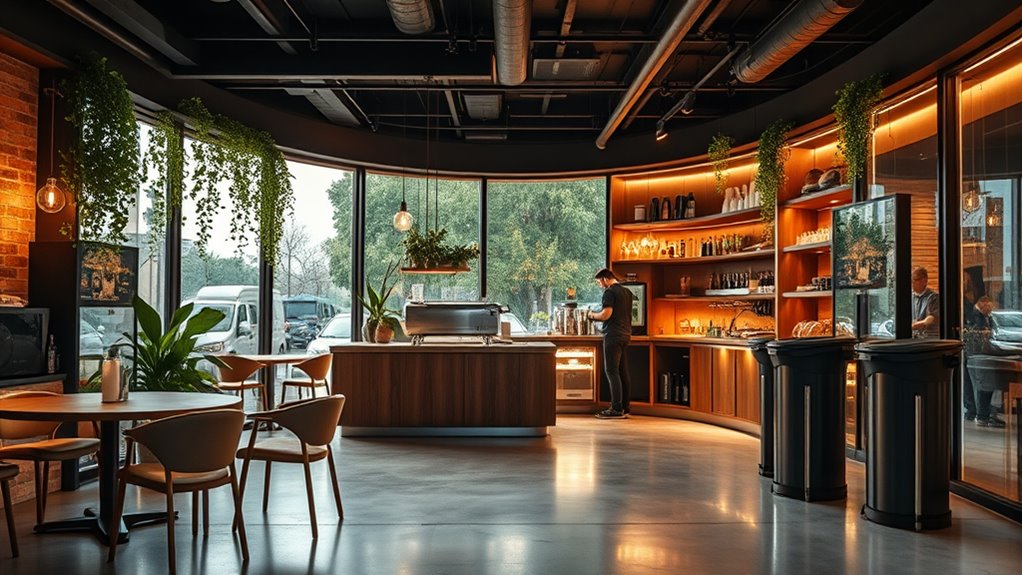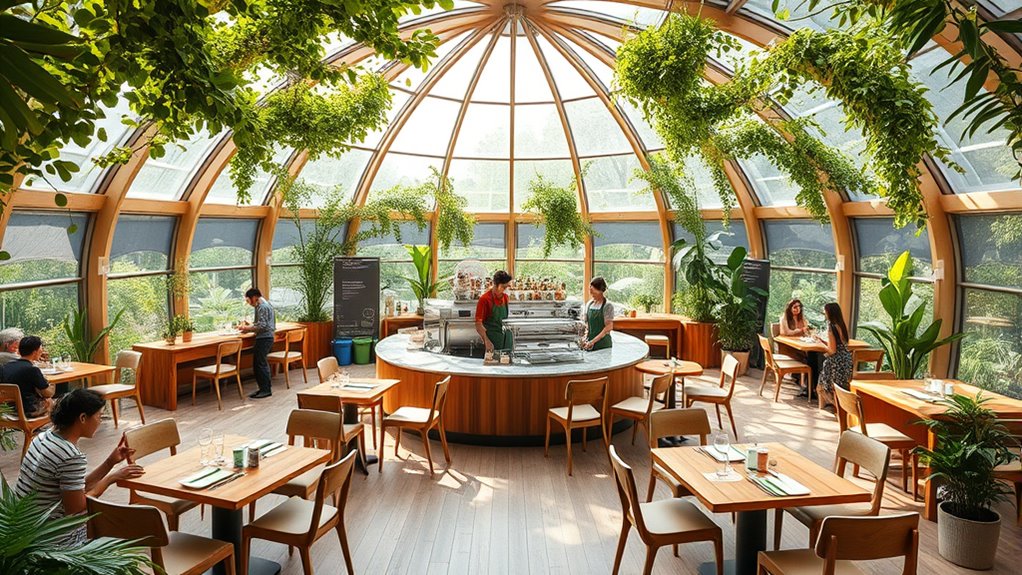Circular cafés show that zero-waste practices can work when you focus on sustainability, like using reusable or biodegradable packaging, encouraging customers to bring their own cups, and partnering with local suppliers. They also prioritize composting food scraps and coffee grounds, transforming waste into valuable resources for the community. By viewing waste as a resource and promoting mindful consumption, they create a positive environmental impact. Keep exploring to discover more about how these cafés are redefining eco-friendly practices.
Key Takeaways
- Circular cafés prioritize sustainable packaging, using reusable, biodegradable, and eco-friendly materials to minimize waste.
- They implement composting programs that turn food scraps and coffee grounds into nutrient-rich compost for community use.
- Customer participation is encouraged through incentives like discounts for bringing reusable cups and proper waste sorting.
- Sourcing ingredients responsibly from local suppliers supports the cafés’ sustainability goals and reduces environmental impact.
- These practices promote a cultural shift towards mindful consumption and demonstrate that zero-waste can be integrated into daily routines.

Circular cafés are transforming the way we experience coffee shops by emphasizing sustainability, innovative design, and community engagement. These cafés prioritize reducing waste and making eco-conscious choices at every step. When you walk into a circular café, you’ll notice a strong focus on sustainable packaging—reusable containers, biodegradable cups, and eco-friendly utensils dominate their offerings. Instead of single-use plastics that often end up in landfills, these cafés encourage customers to bring their own cups or opt for compostable packaging. This shift not only cuts down on waste but also raises awareness about the impact of packaging on the environment. Many circular cafés go a step further by partnering with local suppliers to ensure their packaging materials are sourced responsibly, reinforcing their commitment to sustainability.
A key component of their zero-waste approach involves composting initiatives. Once your coffee grounds or food scraps are used, they’re not simply discarded; instead, they’re directed into composting programs that benefit the community. These initiatives help transform waste into nutrient-rich compost, which can be used in urban gardens or shared with local farmers. As a customer, you can actively participate by composting your coffee cups and food waste, knowing it contributes to a greener environment. The cafés often have designated compost bins that are easy to access, making it simple for you to dispose of waste responsibly. Some even offer incentives like discounts for customers who participate in composting programs, fostering a sense of collective responsibility. Incorporating sustainable practices into daily routines demonstrates how circular cafés are redefining the traditional coffee experience.
The integration of sustainable packaging and composting initiatives demonstrates how circular cafés are redefining the traditional coffee experience. Rather than viewing waste as a byproduct, they see it as a resource that can be reinvested into the community and the environment. This approach encourages you to be more mindful of your consumption and waste habits. It also shows that sustainability isn’t just a trend but a core principle that can be embedded into everyday routines. By choosing to support these cafés, you’re actively contributing to a zero-waste future, reducing your ecological footprint with each visit. The focus on innovative waste management solutions proves that eco-friendly practices can be seamlessly integrated into the café culture, inspiring others to follow suit. Ultimately, circular cafés empower you to enjoy your coffee while being part of a movement toward more sustainable living.
Frequently Asked Questions
How Do Circular Cafés Source Sustainable Materials?
You source sustainable materials for your circular café through upcycling partnerships and local sourcing. By collaborating with local artisans and suppliers, you guarantee materials are eco-friendly and reduce transportation emissions. Upcycling partnerships help you repurpose waste into new, attractive products, minimizing landfill waste. This approach not only supports the local economy but also aligns with your zero-waste goals, making your café a true model of sustainability.
What Challenges Do Circular Cafés Face in Implementation?
You might face recycling challenges and staff training hurdles when implementing circular café practices. Recycling challenges arise from inconsistent waste sorting and limited recycling infrastructure, making it tough to maintain zero-waste goals. Additionally, staff training is essential but can be time-consuming and costly, as everyone needs to understand sustainable practices thoroughly. Overcoming these obstacles requires ongoing education, clear protocols, and collaboration with local recycling programs to guarantee success.
Are Circular Cafés Cost-Effective Compared to Traditional Cafés?
You might think circular cafés are more expensive, but they often prove more cost-effective in the long run. By reducing waste and reusing materials, you can achieve significant cost savings on supplies and disposal. These practices can boost your profit margins over time, as well-maintained reusable systems lower operational costs. Ultimately, embracing zero-waste strategies can make your café more sustainable and financially resilient.
How Do Customers Respond to Zero-Waste Initiatives?
You notice customers respond positively to zero-waste initiatives, showing increased engagement and environmental awareness. They appreciate your efforts to reduce waste, often sharing their support on social media and asking questions about sustainability. This heightened customer engagement fosters loyalty, as patrons value your commitment to eco-friendly practices. By actively involving them in zero-waste initiatives, you create a community that cares about the environment, encouraging repeat visits and spreading your message even further.
Can Circular Practices Be Scaled for Larger Establishments?
Yes, you can scale circular practices for larger establishments by implementing effective scaling strategies. While it’s challenging to maintain zero-waste standards across multiple locations, it’s possible to replicate successful models and foster franchise potential. Imagine transforming a bustling chain into a sustainability leader, where each café upholds zero-waste principles. With strong systems, training, and consistent practices, you’ll see larger establishments embrace circular practices, making a significant environmental impact.
Conclusion
By embracing circular cafés, you support sustainable practices, reduce waste, and foster community connections. You choose eco-friendly options, encourage reuse, and promote mindful consumption. You participate in a movement that benefits the planet, inspires innovation, and nurtures local economies. You can make a difference every time you sip, share, and support. So, step into a circular café, and let your choices reflect your commitment to a greener, more sustainable future—one cup at a time.









